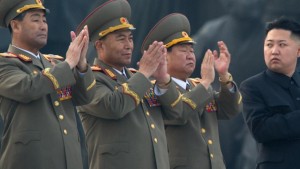 The short-term questions about North Korea’s alleged nuclear test are important. Has there been a real test? What does this mean for the regime’s position? Is Kim Jong Un still trying to consolidate power by pandering to the hardliners of his regime? How will China react?
The short-term questions about North Korea’s alleged nuclear test are important. Has there been a real test? What does this mean for the regime’s position? Is Kim Jong Un still trying to consolidate power by pandering to the hardliners of his regime? How will China react?
All of these are important questions. But all of them distract from the fundamental issue anyone must address to discuss North Korea seriously: It’s not a question of if North Korea will collapse, but when.
The regime cannot go on indefinitely. It is astonishingly corrupt and criminal. Even if it wanted to, it probably couldn’t manage a China-style policy of opening up its economy to raise people’s standards of living while maintaining an authoritarian government to prevent societal collapse. The technocratic know-how simply isn’t there. And the only thing holding the regime together is absolute fear, and the total brain-washing of the population — brainwashing which is slowly dissolving as, inevitably, mobile phones and media, including Bibles, seep into the country.
When it does eventually collapse, it will be a humanitarian disaster on a scale perhaps not seen since World War II. North Korea’s people are famished. To say that alcoholism is rampant is an understatement.
Millions of refugees will stream over the borders. On one side, there’s China and Russia, who aren’t exactly global models of efficiency and humanitarianism. South Korea is a highly-advanced economy — indeed, in some areas, more advanced than the U.S. — but it’s still a small nation ill-prepared to cope with the collapse of its similar-sized neighbor.
MORE PERSPECTIVES
PAUL WALDMAN
How the NRA and gun manufacturers work together to scam gun owners
RYAN COOPER
How Michigan literally poisoned an entire city to save a few bucks
The fall will be a humanitarian disaster, but it will also be a security nightmare. North Korea’s military arsenal, though aged, and probably mostly out of repair, is still enormous, and we should expect warlords to emerge. But this is nothing compared, of course, to the risk related to North Korea’s nuclear arsenal, which is still a huge mystery. Do you think ISIS would like to buy a nuclear weapon? Do you think nobody in North Korea would sell it to them?
These are just a few of the most pressing realities concerning North Korea. But it seems to me that the vast majority of policymakers ignore them in the interest of maintaining the status quo for as long as possible — a situation that will only worsen the inevitable. But why should policymakers do otherwise? Much better to keep a lid on the problem until their term is over.
I’ve argued previously that the responsible solution is a military-humanitarian intervention that would secure North Korea’s military arsenal and create the conditions for a better future for North Koreans — an administration that would transition the economy towards a freer system and, ultimately, reunite North Korea with South Korea. I think China could be brought on board if America demilitarized Korean Peninsula in exchange.
There’s a lot to say about this plan — there are many things that could go wrong with it, and it would be very hard to pull off. But at least it’s a plan.
That’s the thing that brings me despair: Nobody seems to be thinking about how to actually improve the situation in North Korea. More fundamentally, nobody seems to be thinking about how bad things truly are or how plausible, indeed inevitable, the worst-case scenario is.
Everybody seems to be seeing this as a chess game. It’s not. It’s a ticking time-bomb, with millions of hostages. Trying to play the opponent to a draw by dragging your heels might or might not be a good strategy in chess, depending on the game. But thinking that a ticking bomb will go away if you just wait it out is folly.
Let’s find a way to defuse it.
